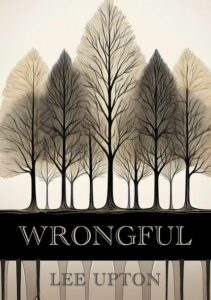 Review by Emily Webber
Review by Emily Webber
Lee Upton is a prolific writer with short story collections, poetry books, novels, and even a libretto among her published works. Now with her latest work, Wrongful, she adds a literary mystery to the list. The novel opens at a literary festival for a prominent children’s author and novelist, Mira Wallacz, who has disappeared in the middle of the event. As the participants look for Mira, it becomes clear their relationships with her are laced with jealousy, competitiveness, and focused on how her fame impacts them. Another novelist, Luisa, muses while searching:
She squirmed against the boulder as she pondered the disappearance of Mira Wallacz. Incredible that such a seemingly dull woman could put out a full-size novel each year with the regularity of production practiced by breeding animals, such as the rabbits Mira wrote about with weirdly undying interest in her books for children.
Eventually, Mira turns up dead in what gets written off as a freak accident—stones falling on her head. As the participants react to the news, more is revealed about the characters who include, in addition to the fellow novelist Luisa, Mira’s agent, a biographer, Mira’s childhood friend, and a publisher (not of Mira’s books). Then there’s Geneva Finch, the last person to see Mira alive in the woods, hanging back in the shadows, observing. The novel eventually picks up a decade later at the same conference, with the same characters, now honoring Mira posthumously. Geneva’s there again, vowing to find out the truth—to assuage her guilt from leaving Mira in the woods that day, just before she died, and to confirm her belief that someone harmed Mira.
There are a few things that aren’t as successful in this book. One minor thing is Upton’s writing tic where she repeatedly refers to characters by their first and last name, which made me pause each time she switched back and forth from first name to full name again. Some of the characters come across as static over the course of the novel, rattling on with the same rebukes or complaints as they were a decade earlier, making them feel flat. Geneva, though, is a welcome contrast. When she comes to the first conference, it’s as a woman who has spent her youth caring for her mother during a long illness. She’s alone, and sad, and barely scraping by. When she was little, her mother read Mira’s children’s books to her, and in turn, she read Mira’s novels to her mother during her illness. Even during the brief time she spends with Mira alive, Geneva feels seen for the first time:
She didn’t say she believed Mira almost knew her, really saw her, that even her past was seen. Maybe not in terms of the particulars. Mira must have imagined what a certain sort of life does to you when you have no help to speak of and you attend a mother’s long illness and the place you lived—”you’re lucky to have a roof over your head”—was peeling away—peeling wallpaper with rot in the ceiling and plaster in piles and the dark mold in the walls…
The reader can truly understand why, even ten years later, Geneva obsesses over the true fate of Mira and is still hounded by guilt from being the last person to see her alive and leaving her in the woods where she died. Aside from that, while everyone else talks of Mira like a mechanism for profit or fame, Geneva sees the power of a writer’s stories at their best. The power to transport, provide comfort and escape:
Mira Wallacz’s novels had given Geneva’s mother nearly miraculous moments that muffled pain. Those novels let Geneva and her mother find themselves in the midst of imaginative adventures, casual, haphazard adventures. The novels were romantic too, not in a gushy way, not in a realistic way either, thank god. Life was better in Mira Wallacz’s novels. Crimes were solved and love endured and enormous cakes were baked and sliced and eaten.
This is Upton’s ode to Agatha Christie mysteries. The novel starts with a dead body, and later another one turns up. There are also many characters, and the reader must puzzle together the real relationships between them and Mira and their true intentions because there is a killer in their midst. Wrongful is a fun read—a delightful mix of snark, quirky characters, and murder—where the reader gains insight into how we often fail to perceive others properly, how easy it is to get things wrong particularly when one is so desperate for answers, and when one wants to relieve themselves of guilt.
Wrongful by Lee Upton
Sagging Meniscus Press May 2025
ISBN: 978-1-963846-21-8
Emily Webber has published fiction, essays, and reviews in The Rumpus, the Ploughshares Blog, The Writer, Five Points, Split Lip Magazine, Hippocampus, and elsewhere. Read more at emilyannwebber.com
